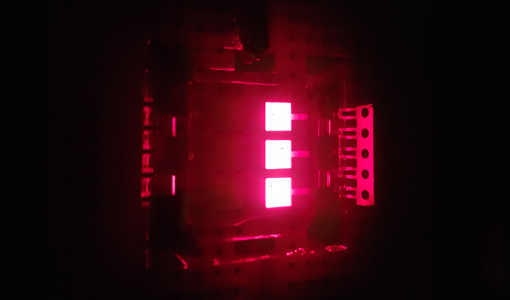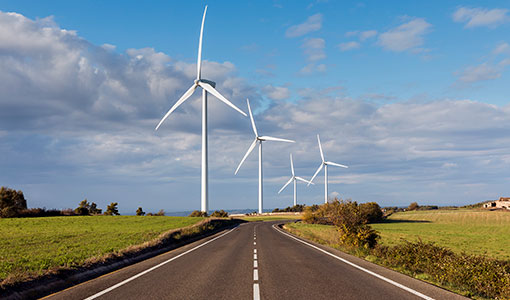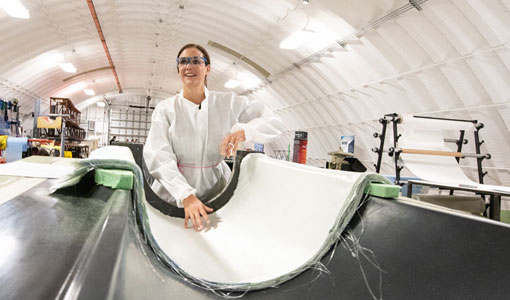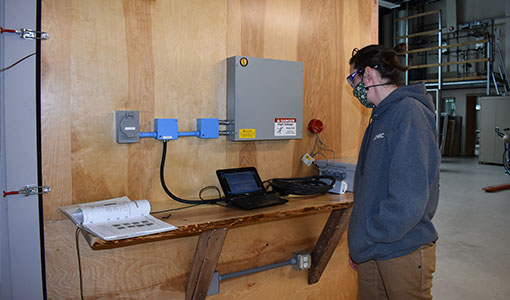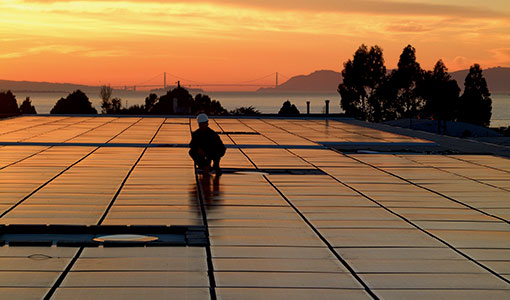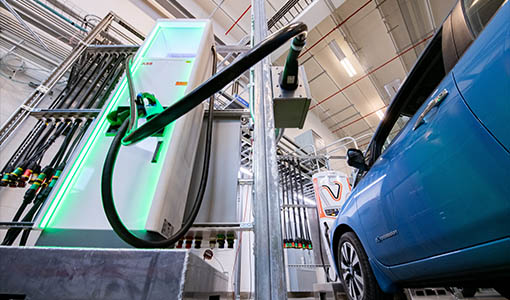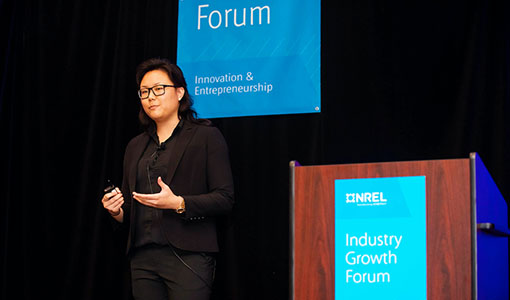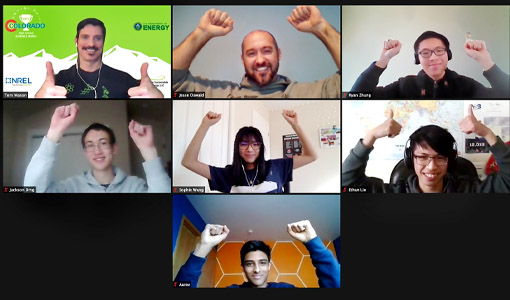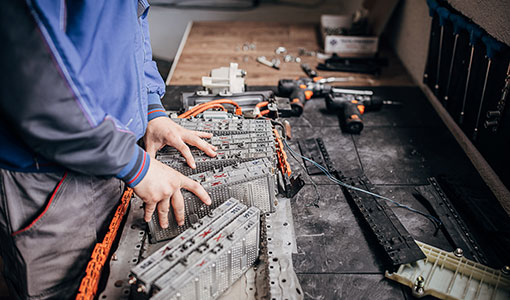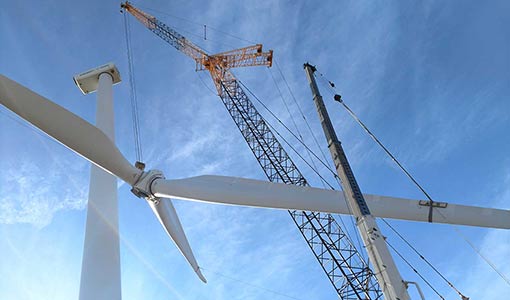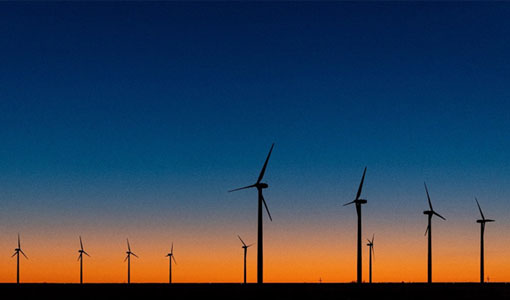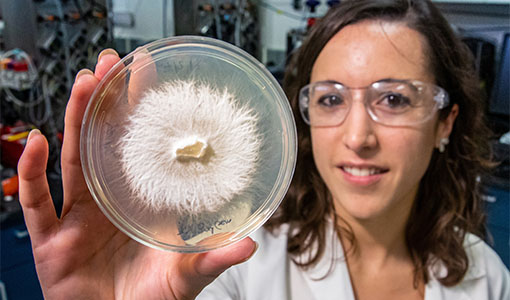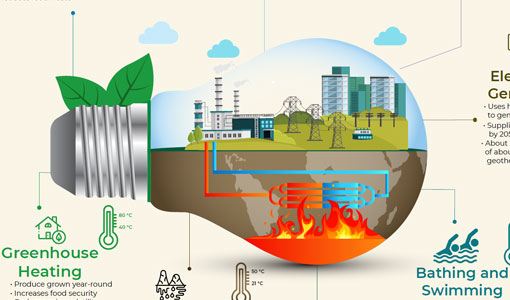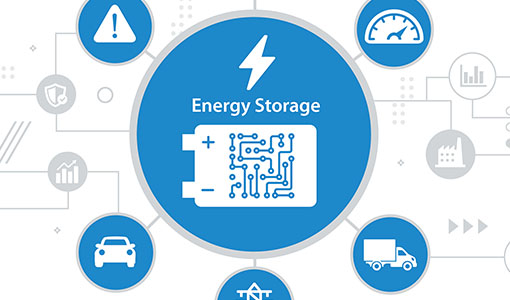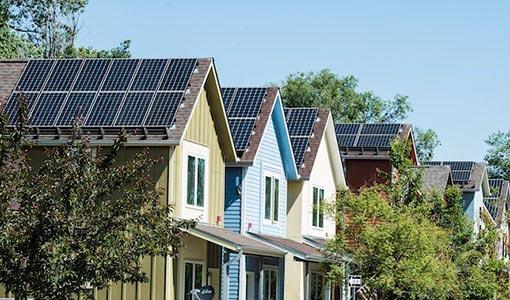March 2021
From Wet Waste to Flight: Scientists Announce Fast-Track Solution for Net-Zero-Carbon Sustainable Aviation Fuel
A novel biorefining process using the untapped energy of food waste and other wet waste to produce a "drop-in" sustainable aviation fuel may lift net-zero flights off the runway sooner than you think.
News Release: New Perovskite LED Emits a Spin-Polarized Glow
The inclusion of a special new perovskite layer has enabled scientists to create a "spin-polarized LED" without needing a magnetic field or extremely low temperatures, potentially clearing the path to a raft of novel technologies.
Beyond Technical Potential: NREL Explores the Challenges of Siting Wind in a Low-Carbon Future
Achieving decarbonization goals—including the Biden administration's climate and energy plan—will require rapid and sustained deployment of wind and solar power.
CoMET Aids Researchers and Partners in Reaching the Stars—and the Market
Next-gen facilities produce next-gen technologies. Learn more about the collaborative CoMET workspace and innovations to come out of it.
Even in Frigid Temperatures, Air-Source Heat Pumps Keep Homes Warm From Alaska Coast to U.S. Mass Market
The air-source heat pump that Tom Marsik installed in his house eight years ago was rare for Alaska. Air-source heat pumps take heat from the outside air, run it through a refrigeration cycle to step up the temperature (just like your fridge, but in reverse), and deliver it to a building.
NREL's New Solar TRACE Tool Adds Transparency to Permitting, Inspection, and Interconnection Nationwide
In partnership with the solar industry, NREL recently developed Solar TRACE, an online tool to increase transparency into PII processes, requirements, and overall adoption cycle times nationwide.
Cyber-Energy Emulation Platform Offers Insights into EV Fast-Charging Station Cybersecurity, Mitigation Strategies
Leveraging the newly developed Cyber-Energy Emulation Platform, NREL researchers evaluated a 50-kW fast-charge station in the ESIF to identify risks and challenges that fast-charge stations could potentially introduce to charging infrastructure.
News Release: NREL Industry Growth Forum Announces 2021 Presenting Start-Ups from Around the World
Forty companies have been selected to participate in the NREL Industry Growth Forum, which will be held virtually again this year. More than 150 companies applied for the chance to present their cleantech innovations to potential investors and engaged industry experts at the 26th annual event.
Science Bowl Encourages Next Generation of Scientists Through Competition and Education
A Fossil Ridge High School team has become the winners of the 31st annual Colorado Regional High School Science Bowl, unseating last year's champions, Cherry Creek High School.
February 2021
Silicon Anode Research Offers Pathway to Increased Driving Range for Electric Vehicles
A new NREL-led multi-lab consortium addresses critical barriers to the development of smaller, cheaper, and better performing lithium-ion batteries for electric vehicles by investigating the use of silicon as an alternative to graphitic carbon anode material.
Q&A with Kristin Munch: Advancing Computing Capabilities To Efficiently Simulate, Analyze Complex Energy Systems
As laboratory program manager for Advanced Computing, Kristin Munch helps develop the vision and strategy for NREL's computational infrastructure and ecosystem.
Community Microgrids From All Angles
With funding from the Solar Energy Technologies Office (SETO), NREL will lead and contribute to multiple projects that emphasize microgrid controls and stability for community-scale systems, building and demonstrating new microgrid designs in a variety of real-system scenarios.
Pathways To Achieve New Circular Vision for Lithium-Ion Batteries
Lithium-ion batteries are increasingly in demand for energy storage and use in electric vehicles—needs that are projected to grow further with expected technological innovations and declining costs.
Research Strengthens Reliability as Wind Power Shifts Into High Gear
Keeping wind gearboxes in operating condition is essential to efficient and cost-effective wind power plant operation. New tools from NREL are making it possible to predict individual component reliability for the entire wind plant, reduce operations and maintenance costs through early design decisions, and take maintenance measures to extend gearbox life spans.
DOE Advanced Manufacturing Office Funds Next-Gen Turbine Blades and More
Recipient of one prime award and playing a supporting role on eight other winning proposals, NREL had a strong showing in the recently announced 2020 DOE Advanced Manufacturing Office Multi-Topic FOA awards.
Lighting the Path to Net Zero: NREL's Research Strategy Drives Deep Transportation Decarbonization
The transportation sector is the largest source of greenhouse gas emissions in the United States, accounting for about 28% of total carbon emissions. Turning that metric to zero stands as a critical task in the global push to drive down emissions to avoid the worst impacts of climate change.
News Release: Groundbreaking Research into White-Rot Fungi Proves Its Value in Carbon Sequestration from Lignin
A foundational study conducted by scientists at NREL shows for the first time that white-rot fungi are able to use carbon captured from lignin as a carbon source.
Students Shed Light on Deep-Down Geothermal Benefits in Infographic Design Challenge
The Fall 2020 Geothermal Design Challenge asked students to tackle an important communications task—create infographics and data visualization to foster understanding of geothermal energy, broadly communicate its benefits, and help overcome key non-technical barriers to geothermal development.
NREL Advances in Battery Research with Physics-Based Machine Learning Accelerates Characterization of Cell Performance, Lifetime, and Safety
Energy storage scientists at NREL are turning to cutting-edge machine-learning techniques to strengthen understanding of advanced battery materials, chemistries, and cell designs.
NREL Software Automates Residential Solar Permitting, Replacing Painstaking Process for Local Governments
NREL has released a no-cost resource for cities and counties across the country to streamline distributed solar installation: SolarAPP (Solar Automated Permit Processing).
Last Updated May 28, 2025


